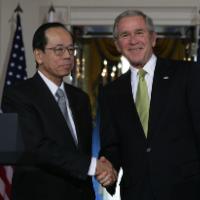This week, world leaders and scientists are meeting in Bali, Indonesia, to articulate a global strategy to deal with global warming. Even though it remains unlikely that major policy initiatives will be announced, the venue provides an important platform to increase U.S.-Japanese leadership on global warming. Historically, U.S.-Japan relations have benefited from multiple layers of bilateral cooperation. As the U.S.-Japan bilateral relationship evolves, traditional military and economic cooperation will prove insufficient to guard against malignant stresses in the alliance. The recent meeting in Washington of Japanese Prime Minister Yasuo Fukuda and President Bush provided the foundation for a new pillar of bilateral cooperation: one that is guided by mitigating nontraditional threats like global climate change. Environmental cooperation has the potential to transcend traditional foundations of bilateral cooperation and guard against future schisms in America's most important Asian relationship.
The U.S.-Japan Alliance Should Evolve to Encompass Environmental Cooperation

